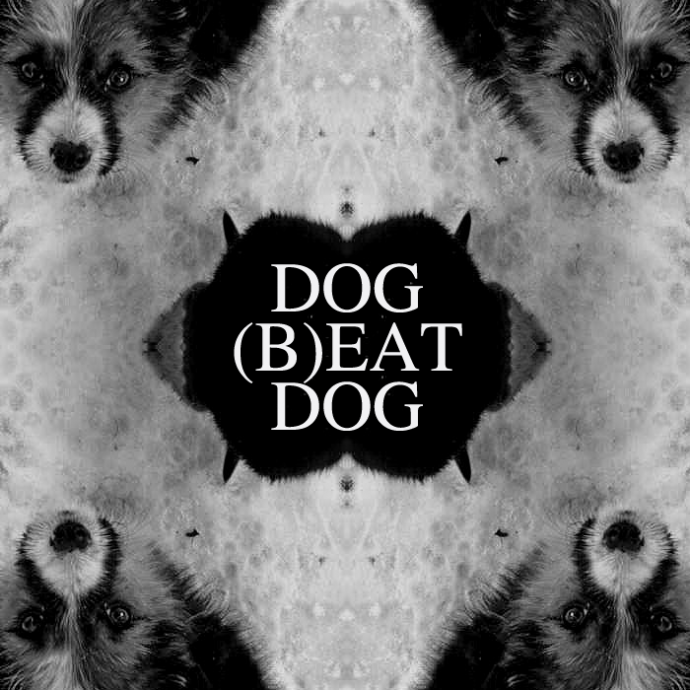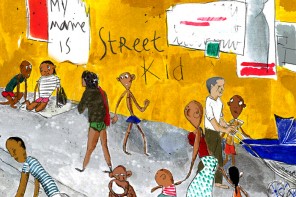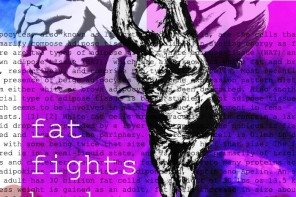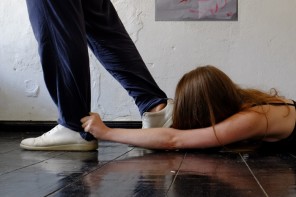Mariya Nikolova was one of Sofia’s volunteer dog-feeders, now helping the adoption of stray dogs in Germany and Austria. Her mother continues ‘the feeding mission’ along with rescuing as many dogs as she possibly can. Here is a testimony about the condition of stray animals in Bulgaria and what is to be an animal activist there.
People call it dog-eat-dog world. This world must be far better than ours. Ours is a man-beat-dog world, man-skin-dog world, man-decapitate-poison-run-over-behead-shoot-dog world. Ours is a nightmare.
My mother packs the 25 bread loaves she has bought in the back of her car, blooming and ready to die inside at the same time. I have my camera ready to point wherever it most hurts. You always keep the number of the stray dogs that you are feeding in the back of your brain, ready to scratch it over, overwrite it, let it bleed out to zero. Ready to subtract the dead ones, un-name them, replace them with newly born, newly dumped ones, newly sentenced to death. Numbers are never constant. We know that. Hell, even Bulgarian dogs know that. Most of the people in Bulgaria do too and are happy, as long as that number keeps going down.
This is what happens when the designated institutions fail; when dogs marked as ‘castrated’ keep on breeding because someone got the money but did not do the job; when owners tire of their pets and let them ‘go free’. Or when people shut down their hearts and live like islands.
According to Gechev, a communication representative at the foundation Four Paws, there were 6,635 stray dogs in Sofia in 2013, a decrease of 2,607 dogs since 2011. Those who hate stray dogs are rejoicing because they do not have to live with their presence much longer. Those who love dogs, like us, are seemingly happy because there are less and less animals that have to suffer in hunger, horror and pain. I say ‘seemingly’ because my mother and I have witnessed something that this statistic omits: we see how these dogs die. Not humanely and not out of appreciation for the quality of their life. They are literally executed, dragged by cars for hours until they breathe their last lungful of life. If Western viewers think that these dogs are euthanized, they are wrong.
What people outside Bulgaria should know about the situation here is that, with regards to stray animals, the majority of work for and against them is done voluntarily. Both the rescue missions and the killing sprees; both the collection of money for curing them and their poisoning, shooting, beheading; both the meetings for helping stray animals and those looking for a slower, more depraved manner of extermination. It is all ‘volunteer work’, one way or the other.
I believe that both groups actually have one and the same goal: no more stray dogs. In our case we want no more stray dogs out of love for them, in the other case it is out of hate. But if the aim is the achievement of a certain European standard of clean streets, free of stray dogs, then the method of decreasing them is unquestionably barbaric.
We start off in Sofia, ready to count, silent.
Driving with my mother, I have learned different statistics… like the price of bread, for example. Dry, hard, horrible bread. And the dogs’ eyes, transfixed on it like it is life’s elixir, irreplaceable and priceless. Like the number of begging eyes and the smaller number of outstretched, human hands that are ready to share dry-as-stone piece of goodness. Like the number of the times a stray dog eats per week, or month; or the number of a stray’s dog chopped off limbs, bullets in its head, fireworks stuck in its behinds. The number of times a heart explodes. His. And ours.
My mother and I drive, stopping every few hundred meters for a shadow of a dog to share bread, from a distance. Most stray dogs have been stoned so often, they are afraid to come near people.
Admittedly biased, I do not believe the alleged number of people bitten by dogs: apparently 490 people for all of Bulgaria in 2012, if one is trusts the articles on Dnes.bg. I do not believe it, firstly because I have had the experience of standing among twenty starved dogs with bread in my hands. If you have not seen a dog that has not eaten for a month, let me tell you that these skeletons are driven to madness. And yet they sit, transfixed by the bread in my hands, ready to run for it and bite their entire pack just to get first to the dry piece. I have never been injured by these dogs, no matter how hungry or wild they were. And hell, if one day I was to be gnawed, it would hurt me less than what people do to each other and to the dogs themselves.
I count how many strays would find home, inside or outside of Bulgaria. How many have died shortly before finding one with a German or Austrian family that likes them.
And then, of course, I count the total number of strangers who shout at my mother and I as they pass us by at our feeding mission.
“Why don’t you help people?” Shout the most humane of the hecklers, the rest being vulgar enough to make us, the dog-lovers, feel like freaks. It is a stupid question; we help those who are hungry, be they people or dogs. But the rest? The rest is incomprehensible to me. The hatred towards those like us; the threats; the pointing fingers; the insults. The war between those who chop off limbs and those who scrape their last money together to buy a dog a wheelchair. The live body of a creature as a battle field?!?
The few people who stop their cars near ours say: “Freaks.”
Does one need a degree in biology to understand that a starving creature does not disappear for a day but perishes slowly, with its shadow thinner and its ribs sharper, harder, more piercing under the skin? People’s ignorance is so fluid that it flows from one problem to the other. Not that my own understanding surpasses the hopelessness of the situation.
I have spent years trying to pinpoint the reason for the brutalities I have seen in Bulgaria. Do those who kill and mutilate stray animals subconsciously need to dig someone else’s grave, just to know that there is someone else out there is worse-off, unhappier, or unluckier than them? I do not know. It is perhaps just a chunk of history, human history, as bloody and gruesome as the rest of it. It is not like the world has ever been stainless.
But I cannot see it as history, distant and anonymous. I keep counting. The number of ribs pushing under the skin out of hunger. Thirty-one is the number of stray dogs we have managed to feed, today. Dogs like shadows. Twenty-five bread loaves are gone in a heartbeat.
Like a child, I keep hoping that the world contains enough good people who will share their home and love with others, be they people or animals. That one does not need to exterminate all stray dogs, albeit in whatever ‘humane’ manner, just to save them the pain and the long-term suffering. That, for those that are born, there is a safe place without pain. Ah, the dream of the volunteers on this side of the battlefield!
And even when I say this, I realize the impotence of my own words in such a world. They are implausible, impractical and naïve. They are going to be laughed at, receive a caustic remark or be passed by because of their inapplicability. We all know that one solves problems with a well-structured, economically viable plan, not with childish hope. Childish hope is only usable for fiction or keeping your head up high on rainy days. But it is no good when one wants to change a certain flaw of reality, rub it out instead of rubbing away our tears.
I am being careful not to write an anti-Bulgarian (and anti-Balkan) article suggesting that most people here are monsters with regards to their (mis)treatment of stray animals. Firstly, because I would never put any number of people under a common denomination; secondly, because I grew up in Bulgaria and know that hopelessness often evolves into frustration – toothless, acrid frustration that grows into terror and cruelty. Do you remain humane if you do not have food to eat? If you do not have food to feed your own child? I do not know.
I hope, of course, for more freaks like us; for those who are not too squeamish to touch the dirty and the sick. For those who feed themselves with the satisfied hunger of someone else, who do not always adopt the ‘perfect’ dog. Who are ready to touch scabbed skin to help cure it, and ease the pain.
We are dirty people. We have adopted more than one cat or dog, and sometimes love them more than we love humanity. We hope to outweigh the numbers. To balance out what the rest of us do to harm animals.
And we drive, counting. Lives. Loss. Sorrow.







